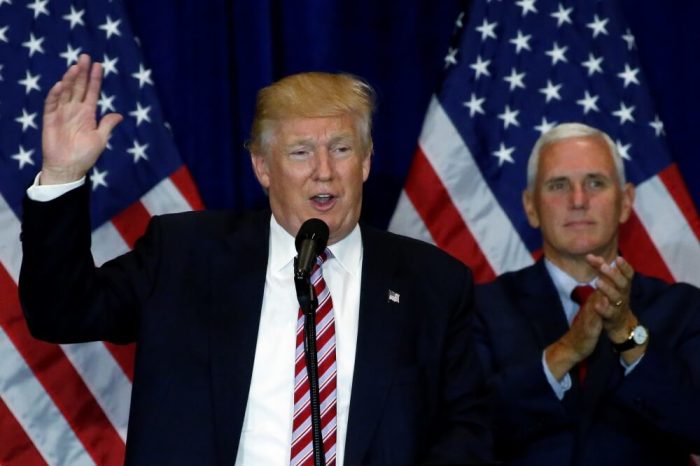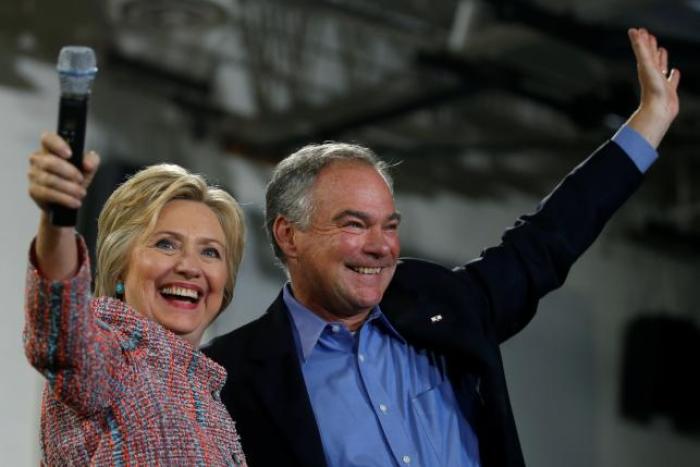76 Percent of White Evangelicals Have 'Made Up' Their Minds to Vote for Donald Trump, Poll Finds

Seven in 10 white evangelicals have their minds "made up" in support of Republican presidential candidate Donald Trump, a new CNN/ORC International poll released Monday morning shows.
The poll also shows Trump has a small lead over presumptive Democratic nominee Hillary Clinton.
The new poll shows that Trump is ahead of Clinton in both a head-to-head scenario and in a four-way contest that includes Libertarian candidate Gary Johnson and the Green Party's Jill Stein.
In the head-to-head scenario, Trump topped Clinton 48 percent to 45 percent, marking a six-percentage-point rise for Trump since the last CNN poll was conducted before last week's Republican National Convention.
In the four-way scenario, Trump earned 44 percent, while Clinton amassed 39 percent. Meanwhile, 9 percent supported Johnson and 3 percent supported Stein.
According to CNN, the last time a significant post-convention jump in one of its polls occurred was in 2000 when both Democrat Al Gore and Republican George W. Bush benefited from 8-point spikes.
The poll was conducted last Friday through Sunday. Surveyors interviewed 1,001 Americans via landline and cell phone. The poll has a margin of error of plus or minus 3 percent.
The poll is Trump's best result against Clinton in a CNN poll since September of 2015.
According to the poll, Trump has a very slim lead over Clinton when it comes to voters who have their minds "made up" about who they will vote for.
Forty percent say they have their mind made up in support of Trump, while 39 percent have their mind made up for Clinton. Six percent of respondents who favored Clinton, say they could change their mind, while 7 percent who favored Trump say they could change their mind. The result also marks a five-percentage-point rise for Trump in the amount of people who have their mind made up to vote for him since the poll was last conducted on July 13-16.
Seventy-six percent of self-identified white evangelicals say their minds are made up in favor of Trump, while just five percent of white evangelicals who favor Trump say they could change their minds. Eleven percent of white evangelicals say their minds are made up in support of Clinton, while 4 percent of white evangelicals who favor Clinton could change their minds. The data on white evangelicals has a margin of error of plus or minus 6.5 percent.

Forty-three percent of respondents said they hold a favorable view of Trump and 52 percent said they hold an unfavorable view of Trump. As for Clinton, 39 percent said they had a favorable view of her and 55 percent said they hold an unfavorable view of the former First Lady.
The result marks the first time since at least September 2006 that Clinton's favorability in a CNN poll dropped below the 40-percent threshold. The result also marks the first time since 2011 that Trump's favorability surpassed 40 percent.
Just 26 percent of self-identified white evangelicals hold an unfavorable view of Trump, while 72 percent of white evangelicals hold a favorable view of him. An astounding 84 percent of white evangelicals hold an unfavorable view of Clinton, while just 15 percent of white evangelicals hold a favorable view of the former Secretary of State.
Despite the six-percent post-convention increase in the head-to-head polling, 44 percent of 882 registered voters say they are less likely to vote for Trump after seeing or reading about Donald Trump at the convention. Just 42 percent say they are more likely to vote for Trump after the convention.
Forty-three percent of independents say they are more likely to vote for Trump after the convention, while 41 percent are less likely to vote Trump after the convention.
While Trump has a three-percentage-point lead in CNN's head-to-head poll, he has a slim 0.2-percentage-point lead over Clinton in Real Clear Politics average of national head-to-head polls. A CBS News poll released Monday finds that Trump and Clinton are deadlocked with 42 percent each.
Although Trump may have a slim lead over Clinton in the CNN's four-way scenario, he trails Clinton by 0.6 percentage points in the Real Clear Politics average of national four-way polls.




























